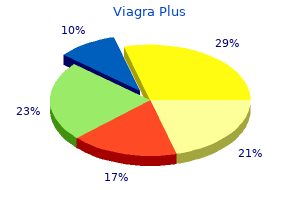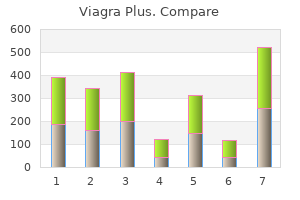"Order viagra plus with amex, erectile dysfunction over 50".
X. Vibald, M.A.S., M.D.
Professor, Medical College of Georgia at Augusta University
Additionally, alternate test forms cannot control other factors such as positive carry-over effect. This might, to some extent, explain why some studies show that alternate test forms reduce or eliminate practice effects, whereas other studies do not. With the above caveats in mind, alternate test forms can be useful in serial neuropsychological evaluations. If the original and alternate test forms are truly equivalent, then there would be (theoretically) a one-to-one correspondence between the two sets of scores (Petersen, 2008). Of course, though they appear similar, the two forms are often not of equivalent difficulty, or otherwise parallel. Thus, in the absence of employing special empirical procedures like test equating, which ``fine-tune the test construction process' (Petersen, 2008, p. Test equating refers to a class of statistical concepts and procedures that adjust for differences in difficulty level on alternate test forms (Please note that these procedures adjust for differences in test difficulty, not differences in content (see Kolen & Brennan, 2004)), so that the forms can be used interchangeably (see Kolen & Brennan, 2004, pp. Test equating establishes, empirically, ``a relationship between raw scores on two test forms that can then be used to express the scores on one form in terms of the scores on the other form' (Petersen, Kolen, & Hoover, 1989, p. The Neuropsychological Assessment Battery (Stern & White, 2003), Hopkins Verbal Learning Test-Revised (Brandt & Benedict, 2001), Brief Visuospatial Memory Test-Revised (Benedict, 2001), and Wide Range Achievement Test-Fourth Edition (Wilkinson & Robertson, 2006) are several examples of tests (or test batteries) that References and Readings Benedict, R. Population invariance and equitability of tests: Basic theory and the linear case. Although Alois had only an older brother when he was born, six more siblings followed him. Alois spent the first four years of his education at Catholic school in Marktbreit, until his family left the area to find a new home with superior educational opportunities for the children. He then decided to study medicine because of his aptitude and fondness for the natural sciences, as well as a sense of duty to mankind. Also called open treatment, the nonrestraint principle proposed the novel view that the mentally ill should be treated with a minimal amount of physical constraint. Although Berlin was the medical capital of Germany, Alois disliked Berlin and its distance from his family. As an aside, due to the influence of his older brother, Alois joined and later held several officer positions in the Franconian Corps. With the completion of his thesis, Alois Alzheimer received his doctor of medicine degree. He passed the state medical examination and was awarded a license to practice medicine in 1888. Shortly thereafter, he became a personal physician to a mentally ill woman and traveled with her for five months. Nonetheless, his contributions to science and medicine did not begin, nor do they end, there.

First Offense the school administrator notifies the school resource officer or designee. The student will be immediately removed from the school by parent/guardian or transported to the nearest medical facility if necessary. The parent/guardian must meet with school administration to discuss a specific plan for the student, including monitoring of behavior as well as treatment. Second Offense within One Year of First Violation the police resource officer is notified. The student will immediately be removed from the school by parent/guardian or transported to the nearest medical facility if necessary. The student must agree to adhere to the treatment plan recommended by the program. The Director of Guidance will refer the student to an in-house counselor for continued follow-up and monitoring of the treatment program. Failure to meet the treatment program requirements will result in an exclusionary hearing. Third Offense within One Year of First Violation the police resource officer is notified. A student in violation will be suspended indefinitely, minimum 10 days, until an exclusionary hearing takes place. The police will take appropriate action under the law regarding the sale of drugs in proximity to school buildings. A student who is experiencing difficulty with drugs/alcohol will be supported through health services, counseling services, and administration. The school system will make every attempt to provide the parent/guardian with a referral for available community resources. The schools will annually review all policies and health curriculum to discourage students from engaging in risk-taking behaviors and encourage positive, healthy life choices. All students are encouraged to see their counselor, nurse, or police resource officer if they feel they are in need of assistance with alcohol or drugs. Students will lose the privilege of attending all school-sponsored events for the duration indicated. Seniors in violation of the drug/alcohol code will jeopardize participation in graduation exercises. The provisions of existing policies that address the use and possession of drugs shall apply to all tobacco products. Tobacco advertising is prohibited in all school-sponsored publications and at all school-sponsored events. School authorities shall consult with local law enforcement agencies to enforce laws that prohibit the possession of tobacco by minors within the immediate proximity of school grounds. To the extent possible, schools and districts will make use of local media to publicize the policies and help influence community norms about tobacco use. Any tobacco product found in the possession of a minor student shall be confiscated by staff and discarded. Students and employees also may be subject to sanctions as determined by written school policy, including disciplinary action. All school staff shall participate in training on the correct and fair enforcement of tobacco-free policies. Preparation and professional development activities shall provide basic knowledge about the effects of tobacco use combined with skill practice in effective instructional techniques and strategies and program-specific activities. Tobacco-use prevention concepts shall also be integrated into the instruction of other subject areas to the greatest extent possible. To send consistent messages to students and their families, school instructional staff shall collaborate with agencies and groups that conduct tobacco-use prevention education in the community. Guest speakers invited to address students shall receive appropriate orientation to the relevant policies of the school/district.

Syndromes
- Shortness of breath
- Sweating
- If your body is still growing
- Down syndrome
- Depression
- Vomiting
- Heart bypass surgery
- Botulinum toxin (Botox) injected into the outlet of the stomach (pylorus)

